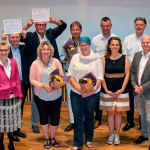Four major players in the healthcare sector now put action behind a shared ambition to strengthen health care and create a better treatment for patients. The Capital Region of Denmark, Region Zealand, University of Copenhagen and Technical University of Denmark are now Greater Copenhagen Health Science Partners (GCHSP) and must jointly strengthen a number of priority health areas.
University of Copenhagen and the Capital Region of Denmark has since 2017 had a close collaboration between researchers and doctors under the name Copenhagen Health Science Partners (CHSP). The collaboration is now being extended to include Technical University of Denmark DTU and Region Zealand.
“By expanding with our new partners, we hope to be able to promote opportunities for all four organisations to strengthen research and clinical development in Greater Copenhagen. The established CAGs already have participating researchers and clinicians from Technical University of Denmark and the Region Zealand, so it is only natural to extend cooperation”, says CHSP director Per Jørgensen.
Moving towards a more integrated health care
The close collaboration between four of the largest players in the healthcare sector is an important step towards a more integrated health care sector. The health technology research coupled to the classic health sciences and clinical practice in the regions will strengthen the health care sector and the treatment options for patients.
“When we see great potential in a broader collaboration, it is because the health care sector has become more complex with a greater dependence on advanced technology. But also because, with Region Zealand, we will have access to the combined clinical and research expertise across all Zealand region”, says Per Jørgensen.
A vision to solve common challenges
With the benefits of closer cooperation there will also be lots of challenges. GCHSP shall identify and seek to remove barriers to research and education partnerships across universities and regions. There are several significant challenges for researchers who work across multiple organizations, each with their organisational structures, incentives, budgets and rules. for example, it can be challenges in relation to share the necessary data related to a research project.
“We are dealing with some very large, complex organisations, and they all want to use their resources to the greatest possible benefit to patients, students and society. It has therefore been important for us to find a model that supports the objectives and efforts of all parties involved. But basically, there is a common will to cooperate, and a belief that together we can create and disseminate better and faster treatment”, says Per Jørgensen.
Four organisations – one common name
Already this autumn GCHSP opens for a joint call, where all four organisations can apply to become a Clinical Academic Group (CAG). The chairmanship of a CAG will consist of a Chairman and vice-chair from a University and a region, all four organisations must be represented among the chairmanship and the key members of the CAG.
GCHSP Secretariat is working to get the next call in the air no later than at the beginning of November.
Joint management
The structure of GCHSP does not change. The Board of partners will be represented with rectors and regional directors from each of the four organisations. Similarly, the Presidency of the Executive Board consist of the dean at Faculty of Health and Medical Sciences, provost from DTU, director of Centre for Regional development in the Capital Region of Denmark and director of Production, Research and Innovation from Region Zealand.
Background GCHSP
The core of GCHSP is the establishment of a number of CAGs in areas with special potential. A CAG is a strong, academically-oriented cooperation structure with researchers and clinicians and other relevant competencies from hospitals, universities and other partners.
The first four CAGs was appointed in June 2017 and the 28 June 2018 four new CAGs was added to CHSP-cooperation. In the summer 2019, four new CAGs will be appointed. All existing and new CAGs will be part of GCHSP.








